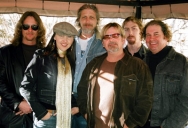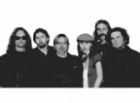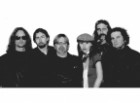There's no denying that the fruition of Hollis Jeffery Brown's lifelong journey down a difficult path of drug addiction and vagabondism has finally led him to a new life with a renewed sense of purpose, and a morally uncompromising, positive classic rock band named Tango Sierra. As the Saskatoon-based group's front man and leader, Hollis now focuses on the principals of honesty, moral ethics and humanitarianism, singing of conquering his lifelong pains and troubles, in the hopes of helping others to do the same.
"I was a drug addicted drifter until the age of 31," he recalls. Scampering from job to job all over the United States, Hollis' life changed in 1988. After awakening nearly dead in a hospital in California, he decided to defeat his demons, and set out to Saskatchewan for a new life and to start a family. In 1992, he also rededicated his life to Christ. Since then, he has not turned back, and only pushed onward as an honest and peaceful person. Hollis loves music, relishing in all of its therapeutic measures for himself, his band, and the listening audience.
"Tango Sierra is a socially conscious band," says Hollis. "Consequently, we're not in the music game for fame or celebrity status." It is a sense of purpose, combined with the culmination of his life stories and successes that gives Tango Sierra its own sense of uniqueness and validity as a rock band. Their testimony? The coming together of band members, and the chance landing of Kenny Greer (co-founder of Red Rider with Tom Cochrane) at the producing helm for the group's official 12-song debut, 'This Is It', released in the spring of 2005.
Good humoured, Hollis and bassist Frank Kelly willingly discuss the road down Tango Sierra's journey.
At the age of 48, Hollis shows no signs of losing any zeal or enthusiasm for today's music scene; before the interview, Hollis is keen on surfing garageband.com and previewing a few of his favourite new artists. Although a singer his whole life, Hollis had never actually played guitar nor fronted a group before TS. He had a previous opportunity, upon winning a vocal audition with a group consisting of members of Ram Jam. Unfortunately, he encountered legal troubles before he could actually join the band and go on tour. Now, years later, Tango Sierra has become his reason to shine.
The band's birth is credited in large part to some of Hollis' friends, who urged him to pursue music more seriously, as he was singing in the church choir. Believing it was finally time, he gathered some members and initiated the process. "I didn't play guitar until I actually joined the band," Hollis confesses. "I didn't get into the guitar until 2000, and 'Tumbleweeds' (the first track off of 'This Is It') was basically the first song I wrote." Hollis reflects, "I lived that (rock) lifestyle until I was 31. I didn't want anything to do with (a band), really, until I was strong enough. Finally, when I felt strong enough, I could pull rock n' roll where I wanted it to go, and not have it pull me where it would've pulled me before. That's when I decided to give it a shot."
Although initially called 360, the band's evolution propelled them to rename themselves Tango Sierra, which stems from the communication code letters T and S. Frank and Hollis met at a Prairie Music Awards workshop, and more members were added as they began jamming. The current lineup consists of Hollis on lead vocals and rhythm guitars, Paul Edmondson on lead guitars, Frank Kelly on bass guitars, Ken Kitchen on keyboards, Sam Dufour on drums, and Sherry Sayers on backup vocals. A demo was initially recorded, which "opened doors for us," according to Frank. Of special note, however, are the musicians who contributed to 'This Is It'. Troy Feener, the studio drummer, is currently touring with Tom Cochrane. Producer and album spear-header Kenny Greer became the album's backbone - not only contributing his musical talents and signature guitar licks to the album, but also producing, engineering and mixing it as well. Hollis and Frank make it known that they are very appreciative of Kenny's work and tutelage.
Hollis applies a very direct and earnest perspective to his songwriting. "(Music) is something I need to do, something I have to do. It helps people, and if I reach one person, that's cool." Granted, as passionate as Hollis is for his music, he still finds it hard for the band members, given their priorities and responsibilities to family and work, to fully throw themselves with relentless confidence into the project. Nevertheless, it is obvious that through the work and confusion which from being in a band at a later stage in life, searching for some level of success in order to make a living, that Tango Sierra wouldn't be making music if it wasn't important to them. 'This Is It', a wonderful testament to Hollis' recovery and transformation, proves this beyond any measure of reason. When asked how important it is for Hollis to craft past experiences in achieving a more honest and meaningful song, he answers, "I think all writers should have their experiences go into their songs. It reaches certain people." He stops himself, adding with a chuckle, "You can go way too deep! I do have a sense of humour too." Relating an experience he had with one troubled fan, he states, "I know I've reached one person. Not to preach or anything, but one person who listened to the music and lyrics got it, could keep going. And I told him if I could make it, you can make it."
"I love music, I love creating and listening to it, but I don't want to know too much about it," Hollis confesses. The mystery of a song, he says, remains the most rewarding aspect of the song. "When I hear a song, (I hear) how it makes me feel, the mood, the whole aesthetic value of it." Hollis isn't interested so much in the theory as he is in what he calls "the mystery of music." Frank says that he loves to play in the band because Hollis has a different perspective on creating music. ''And that's why I love to play with Jeff; his ideas are different because he looks at things in a different manner." Hollis says he doesn't concern himself too much with theory or the more technical aspects of instruments, nor does he want to learn too much of it. "I just don't have time to concern myself with that," he answers. In any case, the meaning and feel of the song remains most important.
'This Is It' immediately impresses with grooving rhythms and smart, message-driven songs. The band ventured out to Ontario to record the tracks at Stable Sound in Mt. Albert. Most noticeable is the stellar production work from Kenny Greer, whom Hollis credits as "one of the world's greatest guitarists." Hollis recounts that Kenny really helped push the band to better themselves, not only in the studio, but as a performing unit as well. "We all just got better. We all rose to another level," he states. Frank says that with the exception of a few small changes, all of the song's bass lines were recorded in one take. Frank adds, "Kenny would be totally focused on one song, and no other," which pushed the band to crystallize that particular song to its very best potential. Both agree the album's success is largely due to Kenny's knowing when, and when not, to push the band. The album has a full, lush sound; the drums are executed expertly, and the tight instrumentation creates a welcoming musical palette for Hollis' warm, inviting and story-like singing. Although backed by Kenny, Frank asserts that Tango Sierra is still their band; "As long as you do what you do, you'll find success. We didn't try to sound like anyone else." The band finds a lot of inspiration in other Canadian singer-songwriters, such as Neil Young and Tom Cochrane. Frank and Hollis are also huge fans of Peter Gabriel and Pink Floyd. Their sound encapsulates a throwback to the classic rock stylings of the '80s and '90s, with a pronounced feel for musical structure and clear lyrics that can be understood without requiring the liner notes.
The lyrics stem primarily from Hollis' past lifestyle and transformation as a Christian. Hollis is certain that Tango Sierra would not have been possible if he had not lived the life and the experiences he has. The album has a Christian penchant that might confuse some listeners, because TS isn't a Christian rock band. Yet, Hollis makes it clear that the messages go hand in hand with his moral convictions, and are pertinent in the world today. "I watch too much news," Hollis laughs, regarding his songwriting process. "I start out with a rhythm, work it out on the drum machine, and start singing. The melody dictates what I'll sing about." Songs like 'Can't Turn Back' and 'Don't Lose It' feel very personal and introspective while being laid out clearly; in the latter, Hollis sings, "You got to use it, your life/Don't lose it, alright?" Hollis' voice itself is nearly in a league of its own; "(It) sounds different, to many people," Frank suggests.
They explain that the vocal tracks remained mostly untouched in the production stage. "Hollis has a clear voice, and thus we didn't have to overly depend on any type of effects or post-production," Frank notes. One exception is the slight addition of a chorus reverb, which accentuates the 'time-worn' feel of the album. Hollis says that this was applied particularly because there were no backup vocals on the album. The album's strength relies on the main vocal, which is steadfast and full of conviction.
In terms of the instruments and equipment used, Frank notes they pretty much used the same gear for the studio as they do for live shows. However, the album's polished sound presented a new struggle for the band, because they had to find ways of sounding as good live as they did on record. The best way to do this, they agreed, was to use their own gear for both processes. "Kenny would hook three amps together, and then pick the best sounding one for the guitar track," Frank recounts. Although he enjoys playing a LarrivÈe fretless bass, his primary guitar is a Fender Jazz model, with classic EMG pickups. Lead guitarist Paul plays a Fury, a brand built and sold out of Saskatoon. Hollis says he primarily uses a Seagull acoustic guitar. In some songs like "Can't Turn Back", one of the album's most delicate and beautiful songs, the arrangements triggering the song are heavenly; Frank explains that the track opens with a keyboard revolution, followed by plucking from a 12-string guitar, which is then crowned with Kenny's stunning steel pedal work, sounding nearly like a floating, creamy organ progression. "Kenny helped piece everything together," Hollis remarks. "He saw the big picture."
In terms of the band's future plans, Frank says, "We're playing it smart." "It's hard for individual members to up and go when they have families, and other priorities which need to be met," reasons Hollis. In any case, the horizon looks very sunny for Tango Sierra; the band's single "Why Baby Why" has received strong airplay on Rock 102-FM in Saskatoon and many other stations across Canada. A new deal with Toronto's Bent Penny Records, and distribution through Maple Music, will help with a nationwide release of 'This Is It' by January. The band has faith that due to their responsible decisions, good things will happen.
For aspiring musicians or people who might think it's too late to pursue any type of serious musical endeavour, Frank simply says, "Work hard, and play hard!" Hollis notes, "It's consuming," and advises others to keep that in perspective when considering their options. Nevertheless, the old adage where there is a will, there's a way stands, and Tango Sierra have found themselves knee-deep in the music maze, hacking away and hoping to yield some type of recognition for the work and the album they've put out for the public.
"(The music) reflects, in a way, the light at the end of the tunnel," concludes Hollis. Indeed, the message delivered, in Hollis' words, is that "you can live." Given his exasperated remarks on the current state of the world, it's of no surprise that support for World Vision and Amnesty International is found within the liner notes. Hollis' strength, powerful words and Tango Sierra's motivated music proves that there are also forces pulling for the good in people. This is the band's culmination; by motivating through their music, they are not only setting a good example for other bands who might take the music lifestyle too hedonistically, but for humanity in general.

Tango Sierra
Socially Conscious, Doggedly Ambitious
by Levi Soulodre
August 4, 2009









